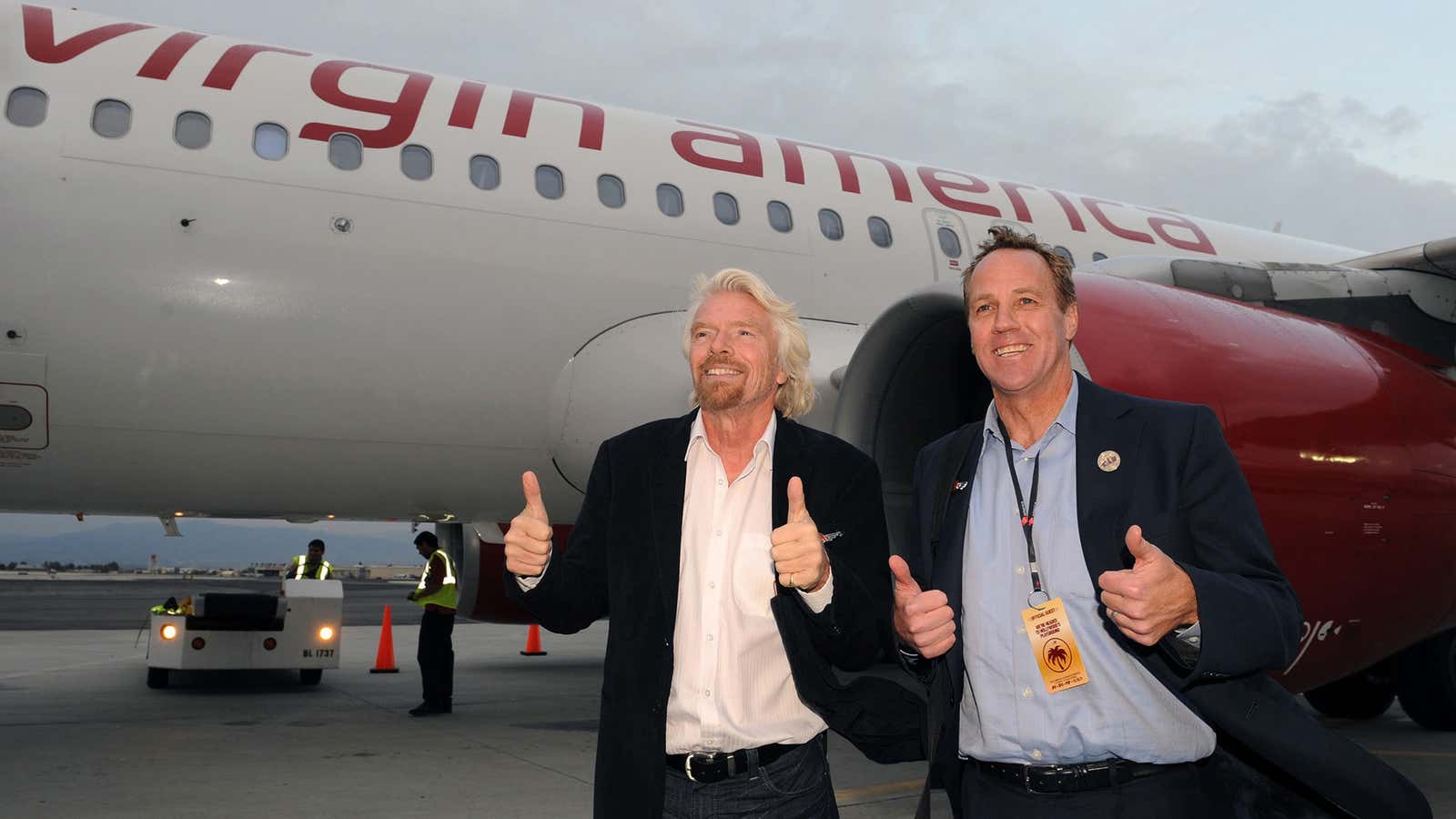from Skift.com
Virgin America has slowed its growth plan amidst some turbulence, and there are lots of analysts who question the airline’s viability.
“I’m surprised it has survived this long, given the huge losses accumulated to date,” says Scott Hamilton, managing director of aviation consulting firm Leeham Co., mincing no words.
“I don’t really see a place in the market for Virgin America,” Hamilton says. “The SFO market is well-served by Alaska, United and Southwest. All other big cities are spoken for when it comes to hubs. An airline like Allegiant found a real niche with its business plan. Spirit Air, as an ultra-low-cost carrier, has a nice niche. Frontier Airlines is converting to an ultra-low-cost carrier. What does Virgin truly offer that its competitors don’t?”
Founded in 2007, Virgin America saw its net loss widen to $31.7 million in the second quarter of 2012, as reported last month, while RASM dipped 2 percent.
The San Francisco-based airline, privately held and with a minority stake from Richard Branson, is entering a self-described “slower growth” period, and will take delivery of just one new Airbus A320 through the first half of 2013 as it rationalizes its route network and strategy.
And, Virgin America is asking employees to volunteer for short-term leave as it reduces capacity 3 percent in the first quarter of 2013, Bloomberg reports.
In the Bloomberg piece, Hunter Keay, an analyst at Wolfe Trahan & Co., argues that the airline may require a “major restructuring” to pull through, and points out that JetBlue and Alaska would benefit from Virgin America’s demise.
“A combination of cash burn and network missteps into highly trafficked markets” are among the challenges, Keay says. “They had an assumption that consumers would choose product quality over price and convenience, and network carriers responded with force.”
Virgin America’s lack of a hub-and-spoke system, given its youth and perhaps lack of options for one, and the absence of smaller aircraft to feed business destinations from a hub, often make it a secondary or impractical choice for business travelers.
“Business travelers are typically driven by frequency, frequent flyer programs and lastly price,” says Hamilton of Leeham Co. “Leisure travel is driven by price, frequent flyer programs and frequency. If I’m flying from Seattle to the Bay Area, I’ll likely fly Alaska for schedule and frequent flyer programs. There typically is no price advantage any more, unless Allegiant is offering flights.”
On the other hand
Virgin America doesn’t see its position as precarious.
“As a private company, we do not comment on specific analyst remarks,” says Virgin America spokesperson Abby Lunardini, responding to a Skift request for comment about Keay’s take on the need to restructure. “However, as we enter a planned slower growth phase, our financing is secure, our cash position is solid, our markets continue to mature into profitability and our product keeps hitting the mark with consumers.”
Lunardini points to the airline winning Conde Nast Traveler‘s Annual Readers’ Choice
Awards as “Best U.S. Airline” for the fifth consecutive year.
“As a new airline that launched into a global recession and an environment of historic oil price highs, we’re now beginning to see a return on the significant growth we’ve fueled over the past two years (roughly 30% year-over-year capacity or ASM growth),” Lunardini adds.
With its leather seats in A320 aircraft, power outlets, live TV and fleet-wide Wi-Fi, Virgin America indeed has picked up many awards, and it appears to be doing well on established routes such as San Francisco and Los Angeles to Boston, Chicago (ORD), and New York (JFK).
The problem comes in bringing newer markets, such as Portland and Seattle, where it faces the wrath of Southwest, Alaska and United, into profitability in a speedy fashion.
Virgin America needs a hub-and-spoke system, contends Henry Harteveldt, co-founder of Atmosphere Research Group, adding that the airline doesn’t fly to vital business-travel markets such as Houston, Atlanta, and La Guardia in New York.
But, Harteveldt concedes that establishing a hub would cost Virgin America “tens of millions of dollars” and there are no easily identifiable candidates.
“All of the good places are already taken,” Harteveldt says.
Harteveldt notes that over the summer the airline hired John MacLeod, who previously handled network management and alliances at WestJet, as Virgin America’s senior vice president of planning and sales, with an eye toward making adjustments to the route network in 2013.
Business or leisure traveler airline?
Harteveldt says MacLeod, when making his evaluations, would have to grapple with Virgin America’s identity crisis — is it primarily an airline for business or leisure travelers?
The airline offers Main Cabin Select and First Class, but does it have enough premium seats for business travelers and leisure travelers who would opt for such services, Harteveldt wonders.
“Virgin America is hitting a rough spot and every business hits a rough patch,” Harteveldt says, adding “it’s going to be hard for Virgin America to rely just on its product.”
Says Harteveldt: “If product were all that matters, then they would be the darling of the airline industry.”
This post originally appeared on Skift.com.
More from our partner site:
Foursquare looks more and more like a travel site
Could Travelzoo scratch its booking site itch by making merger magic with Jetsetter?
